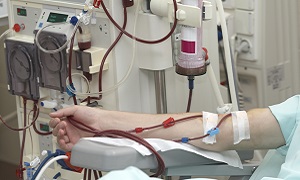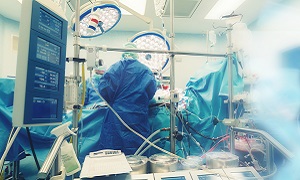Amyloidosis
Amyloidosis is a condition in which an abnormal protein known as amyloid builds up in your tissues and organs. It is a serious health issue, which can lead to even life-threatening organ failure.
Although amyloid is not found in the body normally, it can be formed from other different types of protein. Organs that are affected include the kidneys, heart, liver, spleen, nervous system as well as digestive tract. Some types of amyloidosis also occur as complications of other diseases, and these should improve with treatment of the underlying disease.
Symptoms
In many cases, symptoms are not noticeable till the condition is at an advanced stage. Signs and symptoms are going to depend on which part of your body is affected. Some of the symptoms may include any of the following:
- Swelling of your ankles and legs
- Severe weakness and fatigue
- Unable to lie down in bed due to difficulty in breathing
- Shortness of breath with minimal exertion
- Tingling, numbness or pain in your hands or feet, especially in your wrist
- Enlargement of the tongue
- Unintentional weight loss of over 4-5 kilograms
- Diarrhea, sometimes with blood or constipation
- Irregular heartbeat
- Difficulty swallowing
- Skin changes, such as thickening or easy bruising
If you persistently experience any of the signs and symptoms, associated with amyloidosis, you should see your doctor.
Types, causes & risk factors
Many different proteins exist, which can lead to deposits of amyloid, though only a few have been linked to major health problems. The type of amyloidosis you have is determined by the type of protein and where it collects in your body. The deposits may collect throughout your body or in just one area.
The different types of amyloidosis include the following:
AL amyloidosis (immunoglobulin light chain amyloidosis) – This is the most common type of amyloidosis and therefore is also known as primary amyloidosis. AL stands for “amyloid light chains,” which is the type of protein that is responsible for this condition. The cause is unknown, but it occurs when your bone marrow makes abnormal antibodies that can’t be broken down. It’s linked with a blood cancer known as multiple myeloma. It can affect your kidneys, liver, heart, intestines, as well as nerves.
AA amyloidosis – Previously this condition was also known as secondary amyloidosis. It is caused by another chronic infectious or inflammatory disease which can be rheumatoid arthritis, ulcerative colitis, or Crohn’s disease. It mostly affects your kidneys, though in some cases, it may also affect your digestive tract, liver, or heart.
Dialysis-related amyloidosis (DRA) – This type is generally more common in older adults and people who have been on dialysis for over 5 years. This type of amyloidosis is caused by deposits of beta-2 microglobulin that build up in the blood. Deposits can build up in various tissues, though it most commonly affects the bones, joints, and tendons.
Hereditary amyloidosis – This is a rare form that is passed down through families. It is known to generally affect the liver, nerves, heart, as well as kidneys. There are also several other genetic defects that are linked to a higher chance of amyloid disease.
Age-related (senile) systemic amyloidosis – This is caused when there is a huge deposit of normal TTR in the heart and other tissues. It occurs mostly among older men.
Organ-specific amyloidosis – This is caused by deposits of amyloid protein in single organs, including the skin.
Some types of amyloid deposits have also been linked to Alzheimer’s disease, but the brain is rarely known to be affected by amyloidosis.
Amyloidosis is more common among men than in women. Your risk for amyloidosis generally goes up as your age increases. Amyloidosis also affects around fifteen percent of patients with a form of cancer which is called multiple myeloma.
Diagnosis
Sometimes, amyloidosis can get overlooked as the signs and symptoms can mimic those of more common diseases.
Early diagnosis can help to prevent further organ damage. However, a precise diagnosis is important as treatment is going to vary depending on your specific condition. Several tests can be required which include the following:
Blood and urine tests
Biopsy
Images
Echocardiogram
This technology uses sound waves which create moving images that show how well your heart is functioning. It can also show heart damage which may be specific to particular types of amyloidosis.
Magnetic resonance imaging (MRI)
MRI uses radio waves and a strong magnetic field for creating detailed images of the tissues and organs in your body. These can help your doctor assess the structure and function of your heart.
Nuclear imaging
In this test, tiny amounts of radioactive material, which are also known as tracers, are injected into a vein. This can reveal early heart damage which is caused by certain types of amyloidosis.
Treatment
There is no permanent cure yet known, for amyloidosis. But treatment can help to manage the signs and symptoms and stop or slow further production of amyloid protein. If the amyloidosis has been triggered by another condition, such as rheumatoid arthritis or tuberculosis, then treating the underlying condition may help.
Treatments generally include medications and surgery.
Chemotherapy
Heart medications
Surgical and other procedures
Autologous blood stem cell transplant – In this procedure, your own cells are collected from your blood through a vein. They are stored for a short time while you receive high-dose chemotherapy. The stem cells are then returned to your body through a vein. This treatment is generally appropriate for people whose disease is not advanced and whose heart is not affected much.
Dialysis
Organ transplant
Complications
Amyloidosis can lead to serious complications in the following organs:
Heart – Amyloid reduces the ability of your heart to fill with blood between heartbeats. As less blood is pumped with each beat, this can lead you to experience shortness of breath. If amyloidosis affects the electrical system of your heart, the heart rhythm may get disturbed. Heart problems which are related to amyloid can become life-threatening.
Nervous system – You might experience pain, numbness, or tingling on your fingers. You might also experience numbness, lack of feeling, or a burning sensation in your toes or the soles of your feet. If amyloid affects the nerves controlling your bowel function, you may experience periods of alternating constipation or even diarrhea. If it affects the nerves that control blood pressure, you may feel faint if you stand up too quickly.
Kidneys – Amyloid can harm the filtering system of the kidneys, and this can cause the protein to leak from your blood into your urine. The kidneys’ ability to remove waste from the body gets lowered, which can result in kidney failure and may require dialysis.







